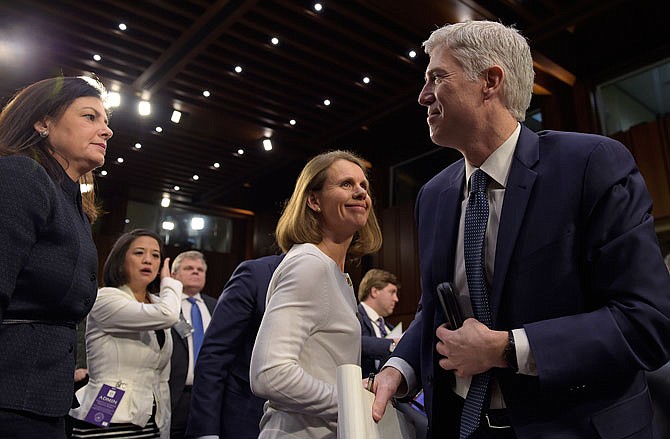WASHINGTON (AP) - Assured of support from majority Republicans, Supreme Court nominee Neil Gorsuch was wrapping up two days of Senate questioning Wednesday to glowing GOP reviews but complaints from frustrated Democrats that he concealed his views from the American public.
Gorsuch, a federal appeals court judge in Denver, refused repeated attempts to get him to talk about key legal and political issues of the day. But he did tell Sen. Dianne Feinstein, who worried Gorsuch would vote to restrict abortion, "no one is looking to return us to horse and buggy days."
The Supreme Court itself threw one surprise Gorsuch's way when it ruled unanimously Wednesday in a case involving learning-disabled students, overturning a standard for special education Gorsuch had endorsed in an earlier case on the same topic.
The decision prompted sharp questioning from committee Democrats.
"Why in your early decision did you want to lower the bar so low?" Sen. Richard Durbin, of Illinois, asked.
Gorsuch said he was bound by an even earlier decision on the 10th U.S. Circuit Court of Appeals and said any implication he was against autistic children was "heartbreaking."
"I was wrong senator, I was wrong because I was bound by circuit court precedent," Gorsuch said. "And I'm sorry."
Later Wednesday, Durbin elicited another apology from Gorsuch. The senator asked about an email Gorsuch sent while working at the Justice Department in which he criticized lawyers at big firms who were representing Guantanamo detainees. The email, Gorsuch said, "was not my finest hour."
Aside from a few uncomfortable moments, Gorsuch generally maintained the mix of earnest talk about respect for prior court decisions, a pledge for absolute independence - "when you put on the robe, you open your mind" - and folksy humor that led to lighthearted exchanges with Republicans about his passion for fly fishing.
"What's the largest trout you ever caught?" Sen. Jeff Flake asked late in Tuesday's session. "Oh, now we're talking," Gorsuch shot back.
But every time Democrats tried to draw him out on a range of serious issues, including abortion and gay rights, Gorsuch answered in the same way: "I have declined to offer any promises, hints or previews of how I'd resolve any case." Gorsuch similarly wouldn't commit to a view on cameras in the Supreme Court, despite widespread support from senators on the Judiciary Committee.
He was sticking to the common practice of high court nominees to resist all requests to say how they feel about Supreme Court decisions.
Feinstein, the committee's senior Democrat, summed up her colleagues' frustration. "What worries me is you have been very much able to avoid any specificity like no one I have ever seen before," Feinstein told Gorsuch. "And maybe that's a virtue, I don't know. But for us on this side, knowing where you stand on major questions of the day is really important to a vote 'aye,' and so that's why we pressed and pressed."
Republicans, on the other hand, couldn't get enough of the Colorado native. Sen. Orrin Hatch said he hadn't seen a better nominee in 40 years in the Senate.
Lindsey Graham of South Carolina lamented what he called the deterioration of the Senate confirmation process since Antonin Scalia, whose seat Gorsuch would fill, and Ruth Bader Ginsburg were confirmed with more than 90 votes each.
"What's happened? Did the Constitution change? I don't think so, I think politics has changed. I think it's changed in a fashion that we should all be ashamed of as senators, and I think we're doing great damage to the judiciary by politicizing every judicial nomination," Graham said.

